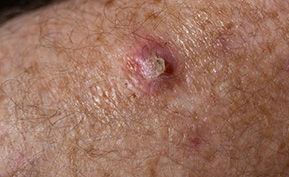
The management of high-risk skin cancers can involve a combination of treatment types, including surgery, topical or oral medications, and other therapies. The treatment used depends on the type of skin cancer, its size, its location, and other risk factors such as its microscopic growth pattern, whether the patient is immunosuppressed or whether they have an underlying malignancy such as leukemia or lymphoma.
Common surgical techniques include standard local excision, scoop excision, curettage and electrodesiccation, and cryosurgery, all of which are best used for low-risk skin cancers. For high-risk skin cancers, such as basal cell carcinomas and squamous cell carcinomas on the face, Mohs surgery is considered the most effective treatment option. This is also a good choice for skin cancers with a high risk of recurrence, or which are large or aggressive, or have hard-to-define borders. Mohs surgery removes cancerous tissue layer by layer while preserving as much healthy skin as possible, leaving patients with the smallest possible scar.
Areas of diffuse sun damage or precancerous change may be fertile ground for developing new skin cancers and it may be difficult to detect skin cancers in these areas. Topical medicines are sometimes used to treat these broad areas of precancerous change to facilitate early detection.
While surgery is standard treatment for most skin cancers, intralesional therapy can be considered for selected tumors based on their size, location, and pattern of growth. This treatment is administered directly into the tumor, providing selective drug delivery that prevents most systemic side effects. Properly selected lesions can be treated in this way with high cure rates. If they do not respond, surgery is required to ensure complete removal.
Oral medications are sometimes used to treat patients with widespread precancerous changes in their skin and a history of multiple skin cancers. These oral medications suppress the proliferation of atypical cells in the skin. Other oral medications can be used to treat certain skin cancers that may not be suitable for treatment with surgery or radiation.
Radiation may be considered as primary treatment for skin cancers in patients who may not be surgical candidates or may not be able to cooperate with surgery. It may also be used after surgery to treat patients who require more aggressive management to prevent recurrence or metastasis.
Patients with advanced or very high-risk non-melanoma skin cancers may be referred to medical oncology for consideration of immunotherapy or targeted molecular therapy.
Patients with complex or advanced skin cancers may require multidisciplinary management with other specialists, including plastic surgeons, oculoplastic surgeons, head and neck surgeons, surgical oncologists, medical oncologists and radiation oncologists. Dr. Ratner often serves as the point person to coordinate the care of these patients, directing them to specialty care according to their individual needs.
Whatever treatment you need, Désirée Ratner, M.D., P.C., can help. Please reach out to us today at (212) 814-5884 to discuss your skin cancer situation and treatment options. We look forward to speaking with you.
Désirée Ratner, M.D., P.C.
115 East 61st Street, 9th Floor
New York, NY 10065
Phone:
(212) 814-5884
Get Directions